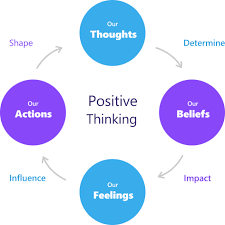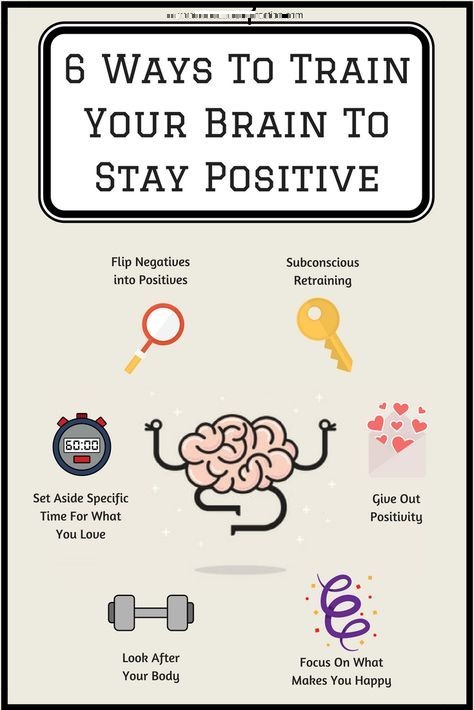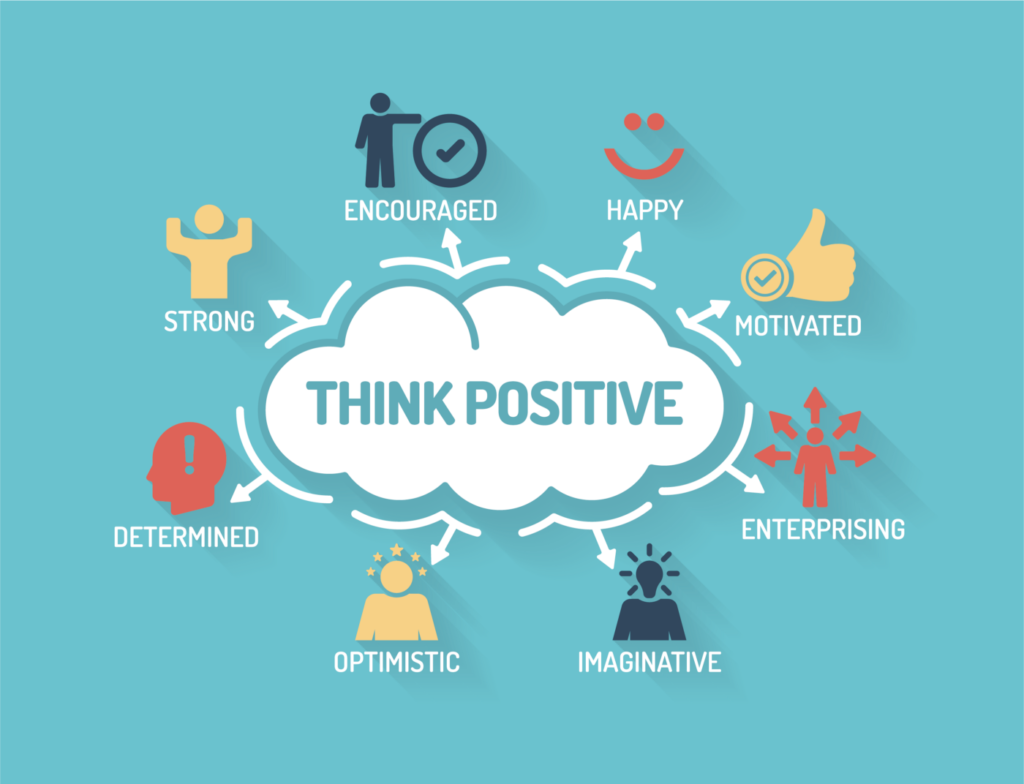What does it mean to think positive? How To Think Positive? In this article, we will explore the importance of thinking positively and some tips on how to do it!
Contents
Understanding Positive Thinking

Positive thinking is the belief that everything will work out for the best. It is a mindset in which you focus on the good aspects of a situation instead of the negative. People who think positively tend to be happier and more optimistic. They also have better relationships and are more successful at work.
History And Development
The term “positive thinking” was first coined by Dr. Norman Vincent Peale in his book “The Power of Positive Thinking”. In the book, Dr. Peale outlines the importance of positive thinking and how to cultivate a positive mindset.
Science Behind Positive Thinking
There is a lot of scientific research that supports the benefits of positive thinking. When you think positively, your brain releases neurotransmitters like serotonin and dopamine which make you feel happy and optimistic. Additionally, when you have a positive outlook on life, it can improve your health!
Benefits of Positive Thinking
There are many benefits to thinking positively. Some of these benefits include:
Better mental health: Positive thinking can help improve your mental health. You will be less likely to experience depression, anxiety, and stress.
Happiness and optimism: People who think positively are generally happier and more optimistic. They see the good in every situation and believe that things will work out for the best.
Better relationships: Positive thinking can help you have better relationships with your family, friends, and co-workers. You will be more forgiving and less likely to hold grudges.
Success at work: People who think positively are more successful at work. They are more likely to be promoted and have better job satisfaction.
Healthier lifestyle: Thinking positively can lead to a healthier lifestyle. You will be less likely to engage in unhealthy behaviors like smoking or drinking, and you will be more likely to eat healthy foods.
Hindrance To Positive Thinking
Despite the many benefits of positive thinking, some obstacles can prevent you from thinking positively. These obstacles include:
Stress: Stress can prevent you from thinking positively. When you are stressed, it is difficult to focus on anything else besides the problem at hand.
Doubt: Doubt can also prevent you from thinking positively. If you don’t believe that things will work out for the best, it is difficult to think positively.
Bad experiences: If you have had bad experiences in the past, it can be difficult to think positively about the future. You may feel like nothing ever goes your way and that positive thinking is a waste of time.
Negative people: If you are constantly around negative people, it can be hard to think positively. These people will bring down your mood and make you feel pessimistic.
Negative self-talk: Negative self-talk is when you negatively talk to yourself. You may say things like “I’m not good enough” or “I can’t do this”. This type of thinking can prevent you from achieving your goals.
Negative thoughts: Negative thoughts can prevent you from thinking positively. If you are constantly focused on the negative, it will be difficult to see the good in a situation.
Evaluating Positive Thinking

Before you can start thinking positively, it is important to evaluate your current mindset. Ask yourself the following questions. Do I:
- See the good in every situation?
- Believe that things will work out for the best?
- Have a positive outlook on life?
If you answer no to any of these questions, then you need to work on cultivating a more positive mindset.
In Relationships
When it comes to relationships, positive thinking is key. If you are constantly negative, your partner will likely feel drained and unhappy. On the other hand, if you think positively about your relationship, it will be more fulfilling and satisfying.
Here are some tips for thinking positively in relationships:
Be positive about your partner: When you think positively about your partner, they will feel loved and appreciated. Make a list of all the things you love about them and read it to them regularly.
Focus on the positive: When you are experiencing a disagreement or argument, focus on the things that you agree on. Don’t dwell on the negative aspects of the situation.
Forgive and forget: Forgiveness is key in relationships. If you hold grudges, it will only cause problems. Forgive your partner for their mistakes and move on.
Be understanding: Be understanding of your partner’s feelings and needs. Don’t try to change them, just accept them for who they are.
In Work
When it comes to work, positive thinking is essential for success. If you don’t believe in yourself, you won’t be able to achieve your goals. Here are some tips for thinking positively at work:
Set goals: When you have clear goals, it is easier to stay positive. When you know what you want to achieve, you will be more motivated to work hard.
Take action: Don’t just sit around and hope for the best. Take action towards your goals and make them a reality.
Be optimistic: Always look on the bright side of things. No matter how bad things may seem, there is always a silver lining.
Believe in yourself: Believe that you can do whatever you set your mind to. If you don’t believe in yourself, no one else will.
In Society
When it comes to society, positive thinking can be difficult. There are so many negative things happening in the world that it can be hard to stay positive. However, if we all think positively, we can make a difference.
Here are some tips for thinking positively about society:
Volunteer: When you volunteer your time and energy, you are helping to make the world a better place.
Talk to others: Talk to your friends, family, and neighbors about the things that matter to you. Positively share your thoughts and feelings.
Donate money: Donate money to charities that align with your values. This is a great way to help make a difference in the world.
Be patient: Change doesn’t happen overnight. Be patient and keep working towards making society a better place.
Cultivating Positive Mindset

If you want to think positively, you need to work on cultivating a positive mindset. This involves developing positive habits and eliminating negative ones. Here are some tips for cultivating a positive mindset:
Self-help Tips
If you want to think positively, you need to work on cultivating a positive mindset. This involves developing positive habits and eliminating negative ones. Here are some tips for cultivating a positive mindset:
Start each day with a positive affirmation: Say something like “I am capable and I can do anything” or “I am happy and healthy.”
Practice gratitude: Be grateful for the good things in your life. This will help to keep your mindset positive.
Spend time with positive people: If you spend time with positive people, it will rub off on you. Negative people can be draining, so try to limit your exposure to them.
Eliminate negative self-talk: Don’t be your own worst enemy. If you catch yourself saying negative things, stop and replace them with positive statements.
Self-care Tips
To have a positive mindset, it is important to take care of yourself. Here are some tips for taking care of yourself:
Exercise: Exercise releases endorphins, which can help to improve your mood.
Get enough sleep: Most people need around eight hours of sleep per night. If you don’t get enough sleep, it will be difficult to think positively.
Eat healthy foods: Eating unhealthy foods can make you feel sluggish and negative. Try to eat a balanced diet of healthy foods.
Take breaks: When you’re feeling overwhelmed or stressed, take a break to relax and rejuvenate. This will help you to think more positively later on.
Self-help Tools
In addition to the tips listed above, some self-help tools can help you to think positively. Here are a few of them:
Journaling: Journaling is a great way to get your thoughts and feelings out in the open. This can help you to process them and move on.
Meditation: Meditation can help to calm your mind and clear your thoughts.
Yoga: Yoga is a great way to relax and de-stress. It can also help improve your mood.
Talking To Professional
If you are having trouble thinking positively, talking to a professional may be the best option for you. A therapist can help you to identify and change the negative thoughts and beliefs that are holding you back. They can also provide support and guidance as you work on cultivating a positive mindset.
Therapies
If you are struggling to think positively, you may need some help from a therapist. There are many different therapies available, so it is important to find the one that is right for you. Some of the most common therapies include:
Cognitive-behavioral therapy: This type of therapy focuses on changing your thoughts and behavior.
Psychodynamic therapy: This type of therapy explores your past relationships and how they have affected you.
Interpersonal therapy: This type of therapy focuses on your relationships with others.
Family systems therapy: This type of therapy looks at the dynamics within your family.
Case Study
Here is a case study of a patient who struggled to think positively.
Patient X was struggling with depression and suicidal thoughts. She had been trying to think positively for months, but she couldn’t seem to make any progress. Her therapist recommended cognitive-behavioral therapy (CBT).
The therapist worked with Patient X to identify the negative thoughts and beliefs that were contributing to her depression. She also helped Patient X to develop positive replacement thoughts. After a few months of therapy, Patient X was feeling much better. She was able to think positively and she no longer had suicidal thoughts.
Hearing From Experts
If you are struggling to think positively, it may help to hear from experts on the topic. Here are some quotes from experts on positive thinking:
“The greatest weapon against stress is our ability to choose one thought over another.” – William James
“Positive thinking will let you do everything better than negative thinking will.” – Zig Ziglar
“If you want to live a happy life, tie it to a goal, not to people or things.” – Albert Einstein
Brain Activity

When you think positively, your left brain hemisphere becomes more active. This is because positive thoughts are logical and make sense. The right brain hemisphere becomes less active, which may be why positive thinkers often have a more rational perspective on life.
NOTE: The left side of the brain is associated with logical thinking and reasoning, while the right side is associated with emotions and creativity.
Positive Thinking In Media
There are also many positive thinkers in the media. Here are a few examples:
Oprah Winfrey: Oprah is a well-known positive thinker. She is the founder of Oprah Winfrey Network (OWN) and has written several best-selling books.
Tony Robbins: Tony Robbins is a life coach and motivational speaker. He is known for his “firewalk” seminars, where participants walk on hot coals.
Wayne Dyer: Wayne Dyer is a self-help author and motivational speaker. He is known for his book, “The Power of Intention.”
Positive Thinking In Books
There are also many books about positive thinking. Here are a few examples:
The Power of Now: The Power of Now is a book by Eckhart Tolle that discusses the importance of living in the present moment.
The Happiness Project: The Happiness Project is a book by Gretchen Rubin. It is about how to find happiness in everyday life.
The Secret: The Secret is a best-selling book by Rhonda Byrne. It discusses the law of attraction and how positive thoughts can create positive results.
Man’s Search for Meaning: Man’s Search for Meaning is a book by Viktor Frankl that discusses his experiences in concentration camps and how he found meaning in suffering.
The Power of Positive Thinking: The Power of Positive Thinking is a book by Norman Vincent Peale. It teaches how to change your thoughts to achieve success.
Criticizing Positive Thinking

Although positive thinking can be beneficial, it is not always the answer. In some cases, it can be harmful.
Here are a few reasons why you might want to criticize positive thinking:
Lead to self-deception: Positive thinking can lead to self-deception, where you believe that everything is going well when it is not.
Ignore negative feedback: Positive thinkers may ignore or discount negative feedback, which can be harmful in relationships and work settings.
Cause people to make bad decisions: Positive thinking can sometimes lead to people making bad decisions because they are not seeing the whole picture.
Lead to denial and avoidance of problems: If you are only thinking positively, you may be avoiding or denying problems. This can lead to further problems down the road.
Lead to a “ Pollyanna” attitude: A “ Pollyanna” attitude is when someone is always positive, even in the face of negative situations. This can be unrealistic and unhelpful.
Can prevent critical thinking: Positive thinking can prevent you from critically examining your thoughts and beliefs. This can lead to stagnation and a lack of growth.
Encourage unrealistic expectations: Positive thinkers may have unrealistic expectations for themselves and others. This can lead to disappointment and frustration.
Cause blindness to negative information: When you’re only thinking positively, you may not be seeing the negative aspects of a situation. This can be dangerous, especially if you’re making important decisions.
Cause people to ignore red flags: Positive thinking can also lead people to ignore red flags and warning signs. For example, someone might continue dating someone even though they have red flags because they are only seeing the positive side of the relationship.
Positive Thinking Bias
Despite these criticisms, research has shown that positive thinking is beneficial. One reason for this may be the positive thinking bias. The positive thinking bias is the tendency to notice and remember positive information more than negative information.
This means that people who think positively are more likely to focus on the good things in life and forget about the bad things. This can be beneficial because it allows people to stay positive despite setbacks and problems.
Although it can be difficult, it is important to think positively. Positive thinking can help you feel happier and more optimistic. It can also help you achieve your goals and improve your life. So don’t give up on positive thinking – keep trying until you find what works best for you.
Conclusion
Thinking positively is not always easy, but it is worth it. When you have a positive mindset, you are more likely to be happy and successful. There are many things that you can do to cultivate a positive mindset, including practicing self-care, spending time with positive people, and using self-help tools.
If you are struggling to think positively, it may be helpful to talk to a professional. There are also many positive thinkers in the media and books. With a little effort, you can too cultivate a positive mindset and reap the benefits!”
A Word From Therapy Mantra
Your mental health — Your psychological, emotional, and social well-being — has an impact on every aspect of your life. Positive mental health essentially allows you to effectively deal with life’s everyday challenges.
At TherapyMantra, we have a team of therapists who provide affordable online therapy to assist you with issues such as depression, anxiety, stress, workplace Issues, addiction, relationship, OCD, LGBTQ, and PTSD. You can book a free therapy or download our free Android or iOS app.


